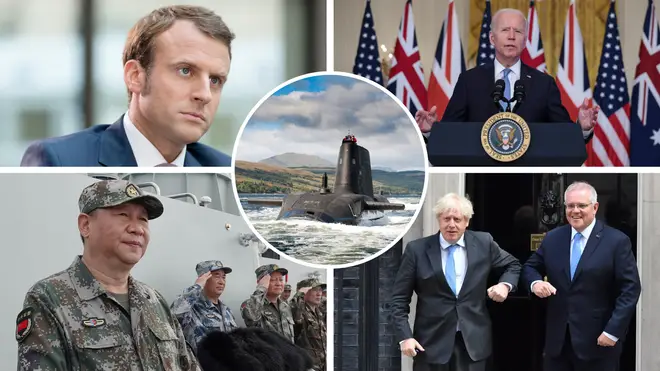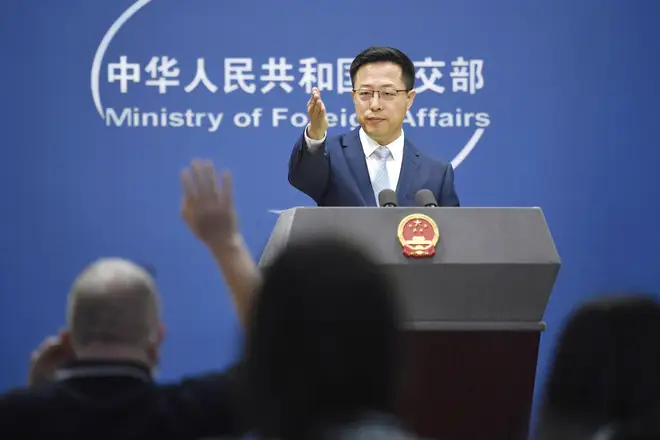
Matthew Wright 7am - 10am
16 September 2021, 09:21 | Updated: 17 September 2021, 17:53

France has accused Australia of a "stab in the back" after they scrapped plans to buy £43 billion worth of French nuclear submarines.
At the heart of the new Indo-Pacific AUKUS pact, Canberra, Westminster and Washington have agreed to work together on building new nuclear-powered submarines for Australia.
But as part of the new deal the Australians will also rip up plans for a 50 billion euro submarine deal with France, in a move that has fuelled fury in Paris.
Read more: UK joins new alliance with US to TAKE ON China – and will help build new NUCLEAR SUBS
Read more: Ursula von der Leyen DEMANDS an EU army - saying Afghanistan proves it needs its own force
"It's a stab in the back. We had established a trusting relationship with Australia, and this trust was betrayed," French Foreign Affairs Minister Jean-Yves Le Drian said in an interview on Thursday.
"This brutal, unilateral and unpredictable decision reminds me a lot of what Mr Trump used to do," he continued.
"It's a break in trust and I am extremely angry."

PM announces AUKUS plans
It comes amidst warnings from China that the new alliance is a "highly irresponsible" threat to regional peace and stability, and a New Zealand ban on any nuclear submarines entering their waters.
Speaking at a press conference from Beijing, Chinese Foreign Ministry Spokesman said the AUKUS pact "seriously undermines regional peace and stability and intensifies the arms race".
He added that it was “highly irresponsible” for the U.S. and Britain to export the nuclear technology, and blamed Australia for a breakdown in bilateral relations between Beijing and Canberra.
“The most urgent task is for Australia to correctly recognise the reasons for the setbacks in the relations between the two countries, and think carefully whether to treat China as a partner or a threat,” he continued.
Read more: Sympathetic cops were TOO SLOW to clear off M25 eco-mob - minister suggests

Boris Johnson defended the Government's decision to join the AUKUS pact, saying the UK's military relationship with France remains "rock solid".
He told the Commons on Thursday: "The House should be in no doubt that this Government's commitment to Nato is absolutely unshakeable and indeed has been strengthened by the massive commitments we have made, the biggest uplift in defence spending since the Cold War."
He said: "Our relationship with France, our military relationship with France, again, Mr Speaker, is rock solid.
"And we stand shoulder-to-shoulder with the French, whether in the Sahel where we are running a joint operation against terrorists in Mali, or whether in Estonia where we currently we have the largest Nato operation."
Read more: Fire hits key power link between Britain and France

Boris Johnson unveils military alliance to take on China’s aggression
British Defence Secretary Ben Wallace has also defended the move, saying that Britain had not gone "fishing" for the opportunity to build nuclear-powered submarines for Australia.
"Fundamentally the Australians made a decision they wanted a different capability," Mr Wallace said.
"We have no intention of doing anything to antagonise the French - the French are some of our closest military allies in Europe, we're sizeable and comparable forces and we do things together."
Read more: Prince Andrew to face SEX CASE in the US as High Court agrees to serve papers

Defence Secretary Ben Wallace discusses Aukus alliance
The multi-billion-euro deal had been reconfirmed by Australian ministers just two weeks ago and only further highlights France's conspicuous lack of involvement in the new AUKUS alliance.
In a statement France said it is a "reliable partner which will continue to keep its commitments" in the Indo-Pacific region, "as it has always done".
The issue "only reinforces the need to raise the issue of European strategic autonomy loud and clear," it continued.
Read more: COVID-19 travel: Will RED LIST be updated today? Shakeup of testing system expected
The comments follow an admonishment from European Commission President Ursula von der Leyen for the EU lacking the political will to create an EU army.
"If we develop this political will, there is a lot that we can do at EU level," she told the EU Parliament.